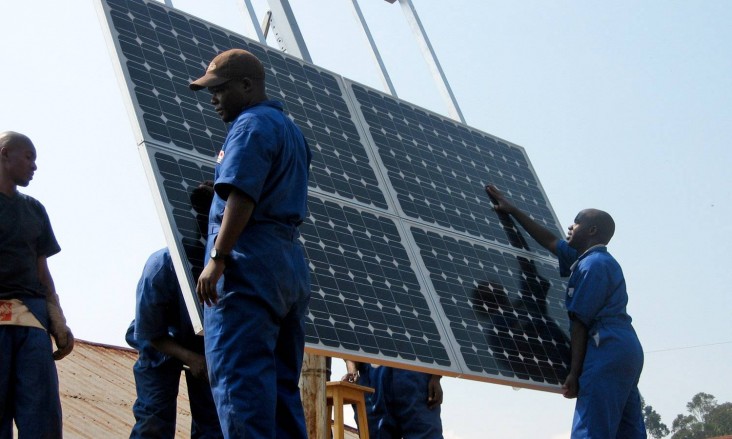- Who We Are
- Mission, Vision and Values
- Organization
- Leadership
- Office of the Administrator
- Bureaus
- Africa
- Asia
- Europe and Eurasia
- Latin America and the Caribbean
- Middle East
- Democracy, Conflict and Humanitarian Assistance
- Economic Growth, Education and Environment
- Office Of Economic Policy
- Office of Development Credit
- Office of Education
- Office of Energy & Infrastructure Programs
- Office of Forestry and Biodiversity
- Office of Gender Equality & Women’s Empowerment
- Office of Global Climate Change
- Office of Land and Urban
- Office of Local Sustainability
- Office of Private Capital and Microenterprise
- Office of Trade & Regulatory Reform
- Office of Water
- Food Security
- Global Health
- Legislative and Public Affairs
- Management
- Policy, Planning and Learning
- Foreign Assistance
- U.S. Global Development Lab
- Independent Offices
- Mission Directory
- Staff Directory
- Advisory Committee
- Board for International Food and Agricultural Development
- Mission Directors
- Coordinators
- Global Development Council
- USAID History
- Operational Policy (ADS)
- Transparency
- Resource Portal

Rising global temperatures pose new challenges for development. More intense heat waves, less predictable droughts and storms, shifting rainfall patterns and ocean acidification – these are just some of the impacts creating new risks for global health, disaster preparedness and food and water security. Many developing countries are facing multiple risks, which threaten to roll back previous gains and worsen poverty, insecurity and instability. At the same time, global investment in renewable energy technologies has surged above $300 billion per year, making solar and wind power increasingly available and affordable. Clean energy promises to deliver multiple benefits, from greater energy security and access to cleaner air and new investment opportunities.
Our Work
Our work to address climate change is guided by USAID’s Global Climate Change and Development Strategy (2012-2018). It spans four types of activities, which come together to prepare countries to address climate risks and opportunities even as they pursue economic growth, stability and security.
- Adaptation activities help countries and communities anticipate and prepare for climate-related risks so they can avoid setbacks and continue to increase economic growth and stability.
- Clean energy activities help countries attract the private investment they need to scale up sustainable and cost-effective renewable energy, minimizing pollution and keeping pace with today’s changing energy landscape.
- Sustainable landscapes activities help countries improve forest and landscape management, which in turn helps to curb landscape destruction and improve livelihoods and disaster resilience.
- Integration activities ensure climate change knowledge and practice is applied, where appropriate, across USAID’s development portfolio to protect U.S. investments from unforeseen risks.
Our Results
Our work stretches across economic sectors, programs and activities. Key results from 2010-2016:
- 52,000 megawatts: With our support, a dozen countries have installed 52,000 megawatts of wind and solar capacity – enough to power 13 million American homes.
- 5.3 million people making data-driven decisions: With our support, more than 5 million people are using world-class U.S. climate and weather data to make better decisions about how to protect crops, homes, lives and livelihoods. Many are meteorological experts or agricultural extension workers who share information, helping still more people make better decisions.
- $3.4 billion in investment mobilized: USAID funding for climate activities has mobilized more than $3.4 billion in additional private and public sector resources from governments, businesses and civil society organizations.
Our Partners
- Bangladesh: Regional science experts in Bangladesh worked with USAID and NASA’s SERVIR program to develop a satellite-data early warning tool to track river levels more than 600 miles upstream, increasing flood warning time by several days. In August 2014, the government issued an early warning for a flood wave similar to waves that have in the past killed thousands. This time 17 lives were lost, at least partly due to the earlier warning.
- Mexico: Mexico tapped USAID expertise to help integrate renewable energy into its power grid. The country’s first renewables auction, in 2016, attracted more than $2 billion in investment to install 2,000 megawatts of solar and wind power, at some of the lowest solar prices yet seen.
- Bilateral Partners: USAID and the U.S. State Department have forged high-level partnerships with 26 countries representing nearly one-fifth of global emissions, all committed to pursuing low-carbon growth. Partner countries include Indonesia, Philippines, Colombia, Mexico, Georgia, Ukraine, Kenya, South Africa and more than a dozen others.
- Tropical Forest Alliance 2020: Pioneered by USAID and the Consumer Goods Forum, this public-private partnership has mobilized dozens of government, business and civil society partners to curb tropical deforestation from commodities including soy, beef, palm oil, and paper and pulp. This work is helping to level the playing field and secure critical supply chains for major American businesses like Cargill, McDonald’s and Walmart.
Contacts
Allen Eisendrath, Office Director
Michelle Jennings, Deputy Office Director







Comment
Make a general inquiry or suggest an improvement.